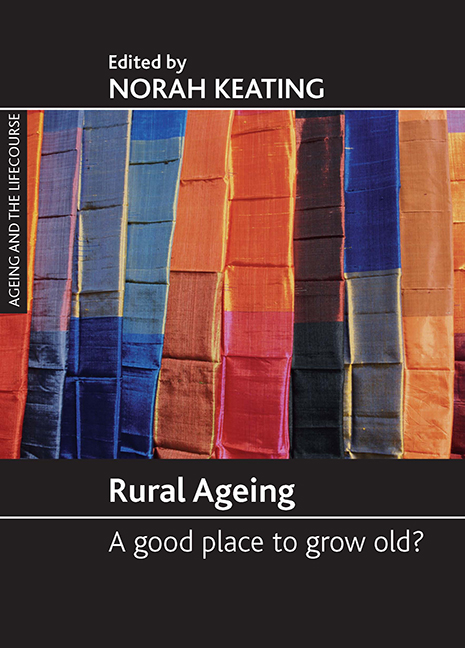Book contents
- Frontmatter
- Contents
- Foreword
- Acknowledgements
- Notes on contributors
- one A critical human ecology perspective on rural ageing
- two Crossing borders: lifecourse, rural ageing and disability
- three Rurality and ageing well: ‘a long time here’
- four The evolution of networks of rural older adults
- five Distance, privacy and independence: rural homecare
- six Respite for rural and remote caregivers
- seven Ageing, disability and participation
- eight Participation in rural contexts: community matters
- nine Staying connected: issues of mobility of older rural adults
- ten Ageing and social exclusion in rural communities
- eleven Age-friendly rural communities
- twelve Revisiting rural ageing
- References
- Index
- Other titles in the Ageing and the Lifecourse series
four - The evolution of networks of rural older adults
Published online by Cambridge University Press: 19 January 2022
- Frontmatter
- Contents
- Foreword
- Acknowledgements
- Notes on contributors
- one A critical human ecology perspective on rural ageing
- two Crossing borders: lifecourse, rural ageing and disability
- three Rurality and ageing well: ‘a long time here’
- four The evolution of networks of rural older adults
- five Distance, privacy and independence: rural homecare
- six Respite for rural and remote caregivers
- seven Ageing, disability and participation
- eight Participation in rural contexts: community matters
- nine Staying connected: issues of mobility of older rural adults
- ten Ageing and social exclusion in rural communities
- eleven Age-friendly rural communities
- twelve Revisiting rural ageing
- References
- Index
- Other titles in the Ageing and the Lifecourse series
Summary
‘They go with the family, their family … I think when you become frail or you’re alone and you have no community resources – I don't mean physical resources; I mean family and very close friends – then, we find that that's why a lot of older seniors move.’ (Service provider, retirement community)
‘Yeah, I’m certainly being helped out…. Well, I don't think I could have stayed here without the boys helping me. They’re not pushing me to move out and I would like to be able to stay here as long as I’m able. I’m not moving in with my family. That's not fair to them and they know that. It just depends on how much help you need I guess. I would hope it would be in a retirement home where I could look after myself and do well. But with, with help.’ (84-year-old widow, farm community)
Introduction
People in one's life have been described as providing the ‘meat and potatoes of social existence’ (Garbarino, 1986, p 31). Supportive relationships are sources of love, intimacy and self-worth, providing tangible assistance and guidance (Lansford et al, 2005). Throughout life, good relationships are associated with better health, well-being and ability to cope with major life events. Lack of high-quality relationships is associated with negative physical and psychological consequences such as anxiety, depression, loneliness and poor health (Garung et al, 2003; Tyler, 2006).
Support to older adults is particularly important because of their place in the lifecourse. Normative experiences of death of parents, retirement, loss of a partner or close friends, or chronic illness make them vulnerable to the loss of social support (Garung et al, 2003). Across a number of countries including France, Germany and the US, researchers have found declines in social network size among older adults with such losses, although in other countries, including the UK, Japan and Taiwan, networks are stable in late life (Wenger, 1989; Antonucci et al, 2001; Cornman et al, 2004).
Social network size is an important determinant of the potential for support. As illustrated in the quotes at the beginning of this chapter, older adults with no proximate social networks may have difficulty staying in their communities, while those with family members nearby may have good potential for assistance – an important issue for those faced with chronic health problems.
- Type
- Chapter
- Information
- Rural AgeingA Good Place to Grow Old?, pp. 33 - 42Publisher: Bristol University PressPrint publication year: 2008



